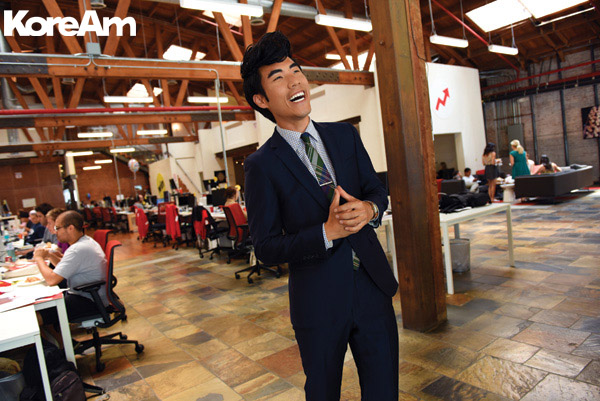Man of the Internet Hour
BuzzFeed’s Eugene Lee Yang lays bare what makes him click with diverse audiences.
story by REERA YOO
photographs by MACEY J. FORONDA
As a video producer, writer, director and actor for BuzzFeed Video, Eugene Lee Yang is one of the most visible and charismatic figures trending on the Internet these days.
It doesn’t hurt that as one of “The Try Guys”—a group of four young men who will try just about any stunt for the digital news and entertainment company’s mega online audience—the 29-year-old is willing to strip down and serve sushi on his naked body, wear women’s lingerie or undergo labor pain simulations to spark conversation among the masses.
But make no mistake, beyond his goofy physical stunts and experimentations on camera, the Texas-raised Korean American, as a filmmaker for BuzzFeed Video, has explored such thought-provoking themes as body image among women or racial bias in online dating. He’s also helping shine a spotlight on diversity and representation in American pop culture through such videos-gone-viral as Awkward Moments Only Asians Understand and If Asians Said the Stuff White People Say, which pointedly turn the tables on racial microaggressions.
Growing up in the Austin, Texas, suburb of Pflugerville, Yang was one of only a few Asians. Getting bullied for his Asian features and Korean cultural background instilled in him an early introspection and sensitivity regarding racial discrimination.
From a young age, the creatively inclined Yang gravitated toward the arts, from illustration to theater to choir, orchestra and dance, but it wasn’t until the seventh grade when a teacher suggested he try filmmaking that Yang considered it a viable career option.
“The thought [of pursuing filmmaking] never occurred to me before because I had no idea Asians even existed in Hollywood,” Yang told KoreAm via email.
After graduating from the University of Southern California with a film degree in 2008, Yang worked as a freelance music video and commercial director for L.A.-based production company The Menagerie. Upon referral from a colleague, he joined BuzzFeed in 2013 as an online video producer. For a year, Yang worked largely behind the camera on various shorts. When he starred alongside comedienne Jenny Yang (no relation) in the BuzzFeed comedy sketch If Asians Said the Stuff White People Say, the video blew up, launching the filmmaker’s path to producing additional relatable content for diverse audiences.
KoreAm spoke with Yang, a Los Angeles resident, about his huge online following and the state of Asian American representation in media today. The following interview has been edited for length and clarity.
KoreAm: Your videos are immensely popular with viewers. Ever reflect why?
Yang: BuzzFeed Motion Pictures fosters a unique, collaborative environment where producers can also be featured as onscreen talent. I think my prevalence is a simple case of supply-and-demand: There can always be more people of color in front of the cameras. The Internet’s response is particularly vociferous when viewers connect with an actor from an underrepresented community.
The beauty of BuzzFeed personalities such as myself, Ashly Perez and Quinta B., is that, because of our wide variety of content and characters, anyone can relate to our videos, regardless of race, gender or sexuality. The fact that anyone can see themselves in nonwhite protagonists has led to a rare, amazing relationship with our online audience.
Which we’ve witnessed with videos like Awkward Moments Only Asians Understand and If Asians Said the Stuff White People Say.
Yes. There’s a sense of agency and authenticity in those videos exploring racial issues that you don’t see in Hollywood. The bottom line is that they’re written, produced and acted by an Asian American. There’s so much value in ownership, and the audience immediately picks up on whose voice is telling a story.
How has the online medium given you more creative freedom?
In online media, we aren’t restricted by out-of-touch producers and formulas perpetuated by racial generalizations. The Internet allows me to present myself as an original person. I’m crass, I’m confident, I’m often naked and I don’t give a sh-t about what people think of me. I am merely representing myself as honestly as possible, and that transparency gradually begins to inform the audience’s perception of Asian Americans. To be fair, I also studied a lot, respect my parents and look fabulous in women’s clothing, but it’s all part of an evolution where we’re representing ourselves to be just as complex as any white leading character.
What was it like being one of the few Asians in your hometown in Texas?
I was bullied and tokenized, as one might expect a kid from one of the only Asian families in ’90s Texas to be, but I wasn’t scarred. The constant categorization of my “otherness” was fueled by lazy insults targeting my face and culture. But I had enough clarity to distinguish my minority struggle from what my black and Latino friends had to endure. While they suffered institutionally, I dealt with kids telling me I was ugly, weird and that my house smelled funny.
Though being Asian was often the source of ridicule, it also became my salvation because my parents constantly reinforced positive Korean values that helped me rise above the ignorance. Today, when people assume I became an “angry Asian man” because I was made fun of, I correct them with this statement: “I wasn’t angry because I was hated or because I hated myself. I was angry because I couldn’t understand how everyone could be so f-cking stupid.” I refuse to attribute who I am today to kids who can’t even appreciate kimchi. F-ck that.
Who has been the biggest influence in your life?
My hair. Just kidding. It may sound banal, but my family is so ridiculously awesome I couldn’t imagine citing anyone else. Sometimes I look at my parents and my grandmother and suddenly remember that they left their fucking home country to give me a better life. I am merely the product of their immense sacrifices … and a ton of hairspray.
Your go-to karaoke song?
It’s a tie between “This Is How We Do It” by Montell Jordan and “That Don’t Impress Me Much” by Shania Twain. If it’s from the ’90s, has a rap breakdown, and doesn’t take itself too seriously, it’s in my karaoke repertoire.
What are your thoughts on Asian American representation in entertainment today, given the emergence of shows such as Fresh Off the Boat and Dr. Ken?
What I think makes the Asian American community so particularly passionate about our portrayals in media is that there’s a thin, blurry line when referring to the “model minority” myth. Intelligence, stoicism, exoticism, emasculation, obedience—we’re all well-aware of the characteristics we’ve been conditioned to use as a reference point for Asian stereotypes. These attributes, unfortunately, also happen to be the framework for most Asian characters in traditional media today. I would hardly blame the actors; it’s lazy, tired writing.
The only way we can continue to expand our impact and negate what pisses us off is by taking more high profile roles, or as I like to call it, “reverse Cameron Crowe-ing.” The television series you mentioned will undoubtedly stir controversy in the way they choose to humanize and/or humor-ize our community, but it’s necessary in our inevitable ascent to confront the clichés that have held us back.
What’s the last good movie you’ve seen in theaters?
I don’t care how controversial the term is—I’m a feminist and have thrived in the company of women who are not only my equals but, in many cases, could kick my ass. I also enjoy epic action sequences and blockbuster popcorn flicks. Mad Max: Fury Road finally proved that the two are not mutually exclusive.

What advice would you offer aspiring Asian American filmmakers?
My advice is to center your experience, honestly and uncompromisingly, on yourself. Being Asian American shouldn’t inform your work; your work should inform what being Asian American means.
There’s a concept called white centering where perspective shifts to the white person’s experience. Media, entertainment and even history are especially prone to centering on whiteness. Minorities may fall prey to this subconsciously because of how we’ve been conditioned to think about race. Many young minority creatives, including myself, get stuck producing cultural tourism for the white elite. We subconsciously advertise minstrelized versions of our ethnic identity because we’ve mentally accepted a white-centric authority and audience.
What would you like to see in the future of Asian American media?
More of us. Just, more. That’s the first step, obviously. After we nail quantity, I’d like to see the quality of Asian American media further emphasize the American aspect of our identities.
We are, like so many children of immigrants, restlessly and wonderfully in-between. You wouldn’t believe how many YouTube commenters still see me in an “Americans Try _____” video and say, “But he’s Asian.” I want to see Asian American media be so enlightening and pervasive that even the dumbest dumbf-ck commenter on the planet will not assume I’m from China.
What is one thing that makes you proud to be a Korean American?
In light of an anecdote my diving instructor, a Korean War veteran, once told me, everyone has a big pile of sticks in their lives that they carry on their backs. Everyone has a mountain that they’re seeking to climb. Others may give up, or take a lighter load, or think of clever ways to make the process easier, but every Korean I’ve known, no matter how heavy the burden, will carry it without batting an eyelash or raising a complaint. Whether it’s a daily task or a lifelong journey, Koreans just do the damn thing, and our diligence and perseverance play a huge role in our successes. I’m proud to be part of a long tradition of “tough motherf-ckers.”
___
Follow Eugene Lee Yang on Twitter at @EugeneLeeYang or visit his official Facebook page.
This article was published in the August/September 2015 issue of KoreAm. Subscribe today! To purchase a single issue copy of the August/September issue, click the “Buy Now” button below. (U.S. customers only. Expect delivery in 5-7 business days.)
![]()





